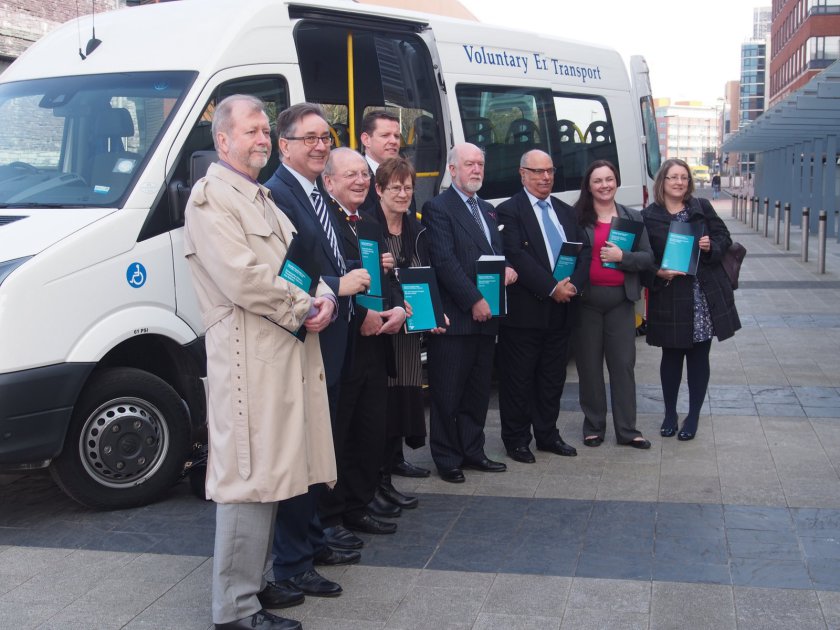-

Bus and Community Transport Services in Wales
-
31st March 2016
-
-
by Sian Summers-Reese
Director for Wales | Cyfarwyddwr Cymru
Community Transport is a lifeline for so many people in Wales. In a country where many people live rurally and rely on community bus routes to access their communities, the importance of constantly innovating and improving services cannot be overstated.
We were pleased to be able to have significant input into a report put together by the National Assembly for Wales’ Enterprise and Business Committee. The report, entitled ‘Bus and Community Transport Services in Wales’, addresses how we can improve the provision of accessible and inclusive transport across Wales.
The Community Transport Association gave evidence to the committee and many of our recommendations were taken on board. In this blog, we’ll look at some of the report’s recommendations and discuss what they mean for the future of accessible and inclusive community transport across Wales.
“The Welsh Government should develop a Community Transport Strategy in consultation with the sector.”
One of the key recommendations that we put forward to the committee was that the Welsh Government needed to develop a comprehensive strategy on community transport in consultation with the sector. We also made this recommendation in evidence we gave to the Committee’s Integrated Public Transport Inquiry back in 2013 although it was not taken on board. “While we did not recommend a strategy at that stage,” the report says, “our concern about a lack of progress in engagement with the sector has led us to believe it is essential.”
CTA explained to the committee that there were growing pressures on Community Transport operators including cuts to funding and uncertainty about the future. The report also found that there is a “failure to understand (or agree) what Community Transport is and what it can and cannot do.” The Committee states that this CT strategy is “to clarify its role in an integrated network and work with local authorities to promote understanding of community transport”.
It is our hope that this comprehensive strategy will mean that more focus and support will be given to the community transport sector and the vital role it plays across Wales. This also links with the report’s second recommendation, one that was also championed by the CTA in the inquiry process:
“Welsh Government should review good practice in the provision of financial and policy support for bus services and Community Transport.”
The Commission argued that the Welsh government should look at the provision of financial support for bus services and community transport that is present across Britain. The aim of this is “to consider what lessons can be learnt and applied in Wales to promote better partnership working and greater stability within Wales.” They also recommend that “…if Total Transport proves effective in England, then serious consideration should be given to adopting a similar model in Wales.”
This is something we certainly support and champion: we believe in an integrated transport system built from the ground up, with Community Transport as a core component, not just as a fall back when commercial services are not available.
Another significant area of recommendation in which the CTA had input surrounds concessionary fairs. The report recommends that the:
“…Welsh Government could explore the current approach to eligibility for concessionary fairs” and “consider how this change might impact on the community transport sector.”
They also recommend that the Welsh Government should “urgently review the reimbursement rates available to Community Transport operators to ensure they are not losing money.”
CTA raised the concerns of the sector with regards to the issue of concessionary fares. The Community Transport Concessionary Fares Initiative (CTCFI) which enabled the use of concessionary bus passes on some section 19 services ended in April 2013 after eight years. This is still having an impact on the sector.
The CTCFI cultivated an expectation among passengers regarding the use of bus passes on community transport services so when the scheme ended, it forced some organisations to change their services from being run on a section 19 permit to section 22 permit. These changes have seriously affected financial viability of some organisations.
Unfortunately for some organisations in Wales, the move from delivering section 19 services to section 22 has led to financial instability arising from low reimbursement rates for the concessionary fares.
Whilst giving evidence before the Committee, Phil Taylor, CTA’s Chair of the Wales Advisory Committee and transport manager for the Aberfan and Merthyr Vale youth and community project, reiterated the concerns that the reimbursement rates available to Community Transport operators running section 22 community bus services, do not cover the full cost of operating that service.
We are pleased that the Commission recommends urgently reviewing the issue of concessionary fares and we will work towards a positive outcome for community transport operators.
The report has a number of other recommendations with regards to proposals to devolve bus registration powers to Wales and whether further powers to regulate the bus industry in Wales are necessary. The Commission argues that there needs to be “urgent talks with the UK Government to ensure that Wales is not disadvantaged when seeking the powers needed to improve bus services for the people of Wales.” They highlighted that under current UK Government devolution plans, cities and regions within England could end up with greater devolved powers over transport than Wales. The Commission argues that Wales should “as a matter of urgency have its own dedicated traffic commissioner.” This is also something that the Community Transport Association agreed with.
The Commission also states, though, that Wales should, at the current time, make “the best possible use of the Executive powers it currently has” through implementing the recommendations laid out by the report.
The report is a very interesting read and we were pleased to be able to contribute to its findings. If you want to read the report in its entirety, you can find it here.
-